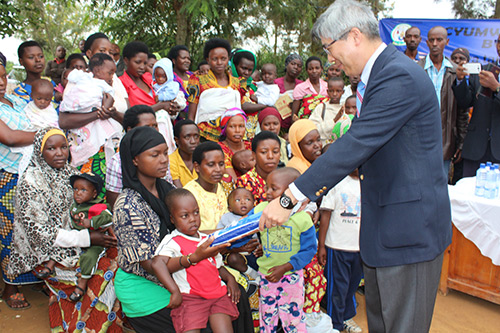
U.S. Deputy Chief of Mission, Eric Wong, distributes an insecticide-treated mosquito net to mothers and children attending the launch of the ITN distribution campaign in Bugesera District, Rwanda. Credit: Amani Athar/USAID
As part of the U.S. Government’s support to Rwanda, PMI procured 1.4 million ITNs that were distributed in late March/early April 2015 to 13 districts with a high malaria burden. Studies have shown that full coverage with ITNs can reduce all-cause mortality by 17 percent. ITNs have also been shown to reduce episodes of uncomplicated malaria by 50 percent as well as decrease malaria prevalence.
The mosquito net distribution campaign was launched on March 30, 2015, in Bugesera District, one of Rwanda’s high-burden districts. To emphasize the importance of net use as a way to keep mothers and children healthy, the event was organized to coincide with Mother and Child Week. The launch was attended by the Minister of State for the Ministry of Health, Dr. Patrick Ndimubanzi, the U.S. Deputy Chief of Mission to Rwanda, Eric Wong, and the Deputy Mission Director of the U.S. Agency for International Development (USAID)/Rwanda, Marcia Musisi-Nkambwe. Over the last several years, Rwanda has made impressive strides in controlling malaria. This achievement has come with strong support from the U.S. Government through PMI, which began its work in Rwanda in 2007.
